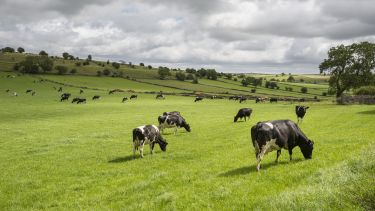Farmers want to see less red tape and better access to the web so that they can engage with the Government’s sustainable farming plans, according to new research.
Experts at the University of Sheffield’s Institute for Sustainable Food and the University of Reading’s School of Agriculture interviewed farmer welfare charities, facilitation groups and farmer-run networks, farm advisors and agri-environment workers to uncover why policymakers find some farmers are harder to reach.
Complex bureaucracy, lack of trusted advisory support and poor internet connections are key issues that prevent them from getting involved in the design and delivery of the Environmental Land Management (ELM) scheme, which will replace European Union subsidies from 2024.
The researchers warned that failing to engage ‘harder to reach’ farmers risks damaging consequences for the environment and threatens the viability of farm businesses in some of England’s most iconic landscapes.
The ‘public money for public goods’ approach will reward land managers in England for improving biodiversity and delivering cleaner air and water, healthier soils and flood protection. The Department for Environment, Food and Rural Affairs (Defra) has committed to ‘co-designing’ the new policy with farmers, but previous consultations have only seen larger farmers and organisations getting involved in the process.
Along with the impact of the ‘digital divide’ and limited access to broadband in rural areas, the new study found that past experiences with bureaucracy and distrust of Defra and government agencies put many farmers off responding to the government’s efforts to involve them in policymaking. Lack of time, social isolation, and age of the farmer were also found to make it difficult for some to contribute and participate in the co-design of Environmental Land Management.
The study showed that paying farmers correctly and on time was crucial to the new scheme’s success - as late payments have contributed to an erosion of trust and faith in previous policies.
The researchers recommended a simplified bureaucracy and the creation of non-digital ways for farmers to get involved. They called on ministers to review implementation timescales regularly and fund farm advisors with strong interpersonal skills and training in agri-environment issues, to support farmers through the transition to the new scheme. This is key to achieving the aim of protecting the environment, as socially isolated farmers are more likely to use unsustainable farming practices.
The new Environmental Land Management scheme represents a dramatic shift away from the previous support regime, with huge potential to restore nature to health. But for it to keep farms in business after Brexit and improve our environment, farmers must have a say in its design. Defra has made a commitment to co-designing ELM with stakeholders and our research offers insights on how to make these conversations as inclusive as possible.
“Our findings showed some farmers are forced to drive to the nearest McDonald’s to access decent wifi, and many find the online schemes difficult to engage with. The government should provide IT assistance and invest in rural broadband – not just for our economy, but for the environment too.”
Dr Ruth Little
Lecturer in Human Geography at the University of Sheffield
Dr David Christian Rose, Elizabeth Creak Associate Professor of Agricultural Innovation and Extension at the University of Reading, said: “We have known for some time that farmer engagement in agri-environment schemes is dependent on the availability of free, trusted advice, as well as payment being provided on time with no harsh penalties for administrative mistakes.
“Our findings show that known solutions, including providing free advice, improving rural broadband and non-digital response options, reducing scheme complexity and allowing local flexibility must be prioritised to ensure that Environmental Land Management participation is high. ELM must also be attractive to land managers not widely in current agri-environment schemes, such as pigs, poultry, horticulture, hobby farmers and large landowners.”
Contact
Sophie Armour, Media & PR Officer at the University of Sheffield: 07751 400 287 / 0114 222 3687 / sophie.armour@sheffield.ac.uk



